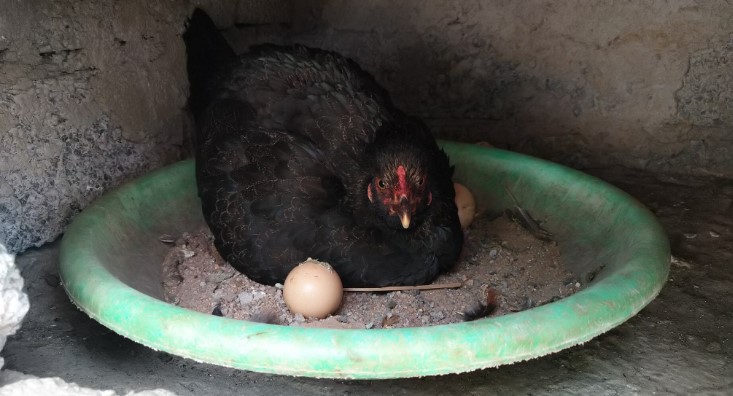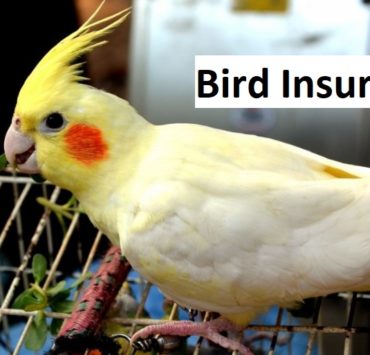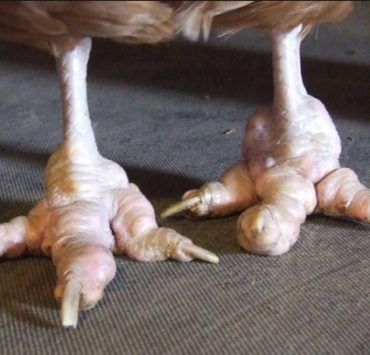
Egg binding in birds may sound benign, but far from it. It is a serious medical condition that’s often fatal if your chicken doesn’t receive emergency medical treatment.
If left untreated, death occurs in a matter of hours. Therefore, you need to know how to tell if a chicken is egg bound and what to do in such a situation.
Here’s everything you need to know about it.
What Is Egg Binding?
Chickens “in lay” usually lay an egg once every 25 hours – give or take. Egg binding describes a situation where an egg gets stuck somewhere in its oviduct, usually between the uterus and cloaca.
The cloaca is the vent through which a chicken expels eggs and feces. When an egg is ready to pass, the cloaca seals the intestinal opening to prevent the eggs from getting covered in poop as they exit the vent.
The next logical question would be – Can a chicken die from being egg bound? The short answer is – yes, they can.
When an egg gets stuck in the oviduct and is unable to pass, the intestinal opening remains sealed for the entire duration. If an egg bound chicken can’t poop within 24 to 48 hours, they’ll likely die.
Vent prolapse is yet another effect of egg binding where the vent hangs out of the chicken’s posterior. When this happens, the ruptured yolk of a developing egg may get deposited within the hen’s coelom (body cavity).
This may cause a condition known as egg yolk peritonitis, where the yolk material becomes infected with bacteria – the most common being E. coli. This could then spread into the bloodstream, causing a secondary and potentially life-threatening infection in major organs like the heart, liver, and kidneys.
Why Do Chickens Get Egg Bound?
Several factors can contribute to the onset of this condition in chickens. Hens on a high-protein diet are susceptible to egg binding. Dehydration, low-quality feeds, intestinal worm infestation, and even stress can all cause a chicken in lay to become egg bound.
In other cases, it could be due to calcium deficiency. Calcium is necessary for the proper muscle contraction required to move the egg along the oviduct before it is finally expelled through the vent.
Even a large double yolk egg that’s too large to pass can lead to egg binding in chickens. Other potential causes include:
- An infection in the oviduct
- Disturbance during the laying process
- Egg retention due to insufficient nesting areas
- Genetics
- Misshapen eggs
- Obesity (causes the muscles to become weak due to inactivity)
- Elderly chickens
- Premature layers (when a chicken starts laying eggs before its body matures)
Signs of Egg Bound Chicken
How can you tell if a chicken is egg bound? Sometimes, you’ll be able to see the egg from the vent. Other times it might be stuck further up the oviduct.
Being able to recognize the signs of egg-binding in chickens is critical to their survival. Remember, timing is of the essence here, so you’ll need to act fast.
Here are some of the common symptoms you need to look out for.
Constipation
If you notice that your hen’s droppings look abnormal or that they’re pooping less frequently or not at all, those are all tell-tale signs of an egg-binding condition.
Fluffed Up Feathers
This is one of the most common sick bird symptoms in chickens. If they’re sitting with their feathers fluffed up, it could be a sign that they’re egg bound. Assess them for other symptoms to know for sure.
Labored or Rapid Breathing
A chicken that’s egg bound looks like it is having a hard time breathing. It may even be slightly rapid. These are both signs of egg binding.
Loss of Appetite
This is yet another common symptom of illness in birds. If your hen isn’t eating or drinking like they should, assess them for other symptoms to determine if they’re egg bound.
Sitting for Extended Periods
Egg-bound eggs put a considerable amount of pressure on a chicken’s spine and the nerves that go to the legs. As a result, you may notice them sitting for uncharacteristically long periods, and if they do walk, it’s often labored and with their eggs apart.
Swollen Stomach
Egg-bound chickens usually have some swelling around their posterior from straining to pass an egg, with no success. Their stomach may appear swollen as well.
How to Help an Egg Bound Chicken
As soon as you’ve determined that your hen is indeed egg-bound, you need to act quickly to prevent its condition from deteriorating. If you don’t, your chicken could die within 48 hours.
Keep in mind that you’ll need to handle your hen with extreme caution to avoid breaking the egg inside them. If this happens, it could lead to infection (peritonitis) and eventual death. Here’s how to treat egg binding.
You’ll need:
- A tub of warm water
- Epsom salts
- KY jelly or vegetable oil
- Liquid calcium and poultry Nutri-Drench
- A large box or crate
- ● Heating pad and warm towel
Step 1
Add the Epsom salts to the warm water and then gently submerge your hen’s lower body and vent in it for about 20 minutes. Delicately massage their abdomen while they’re soaking in the tub.
Step 2
Next, take your hen out of the water, place them on a dry towel, and blot their feathers carefully. Rub some KY jelly or vegetable oil around their vent to lubricate the passage and proceed to gently massage their abdomen once more.
Step 3
Place the hen on a warm towel over a heating pad in a large box or crate. This should be in a dark, quiet room. Then, give the hen a solution of the liquid calcium and Nutri-Drench and leave them for about an hour. If they still don’t pass the egg in this time, repeat the process every hour until they do.
Step 4
If the egg is visible from the vent opening, use a syringe to carefully suction its contents before gently breaking up the shell. Make sure you keep the fragments attached to the membrane.
Proceed to remove it using the lubricant you had squirted around the vent. Keep in mind that this should only be done as a last resort after all other remedies have failed.
Everything in Moderation
Egg binding can be a nightmare for both the hen and the owner. If you’re wondering how to prevent egg binding, all you have to do is ensure that you feed your chickens a healthy diet that’s rich in calcium.
For the heavy layers, supplement with oyster shell grit or crushed eggshells. Don’t add it to their daily feed, though.
Go easy on the protein as well. This will ensure they lay regular-sized eggs that can pass through their oviduct easily.
For more information on bird health, use our online Vet Chat to talk to any of our qualified avian veterinarians today.




